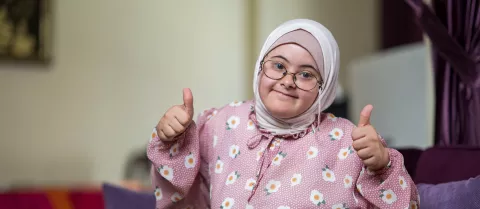Dania’s Story – capacity building through inclusivity
UNICEF Lebanon and the Government of Canada working together to promote inclusivity of education for children with disabilities

- Available in:
- English
- العربية
With a smile that lights up the room, 10-year-old Dania Al Fares is everyone’s favourite in class at the Bourj Hammoud centre of the Mouvement Social. As noisy and energetic as her friends around her, Dania’s story is one markedly different from those of her classmates. From Syria and now a refugee in Lebanon, Dania was born with Down Syndrome.
Dania’s elderly father, Khaled, brought his family to Lebanon after his home and business were both destroyed during a single night of violent destruction. Throughout much of her short life, he has home-schooled Dania – working hard to ensure she was receiving constant educational stimulation despite a lack of support in Syria. “However,” he says, “I always knew she would be forever disadvantaged if we didn’t get her enrolled in a proper education programme”.
Dania’s place at the centre was secured thanks to the commitment of UNICEF Lebanon to ensure that at least two percent of children supported in education programmes are children with disabilities. With funding from the Government of Canada, UNICEF is able to provide NGOs with capacity building, human resources and additional services for the children.
Attending Mouvement Social for six months now, Khaled has seen Dania’s progress accelerate tremendously. “She has learned to count, as well as to recognise and write her own name”, he smiles proudly. “Most importantly, her confidence amongst other people has improved too. We first brought her here a year ago, but within just three days we had to withdraw her – even the normal commotion within class was too much for her to cope with and she became very distressed”.
It is a very different girl we see in class today. She has friends, each of whom are eager to talk about Dania and to share their affection, albeit tempering their feelings with a measure of reality. “We know she needs our help sometimes,” classmate Shahad explains, “but we all take it in turns because we enjoy helping her. It makes us feel good about ourselves when we can do it”.
Dania finds verbal communication difficult, yet this has never stood in the way of making friends and learning through play at school. Another classmate adds that, “She joins in with all of our games. She likes to play with things the same way we do and is always fun to be with. She’s not really so different to us in many ways”.
For father Khaled, Dania’s classmates have made the transition to education much easier than he had expected. “This is the first time they’ve encountered a child with Down Syndrome. Prejudice could reasonably be expected. At first, they were unsure of Dania, of how to react to her. Quickly though, they began to include her in everything they do”.
“Inclusion for all my pupils is important, but it is especially vital for children such as Dania. Being at school and involved in everything is important for her, but it’s also very beneficial to my other pupils. They’ve learned to see Dania as just another classmate. Someone else to look out for, someone else to take care of. Over time they’ve come to value Dania for what she brings to the life of classroom, not to judge her for what she cannot do”.

Perhaps the biggest influence on his daughter’s days at school is her teacher, Heba. They spend a lot of time together, Dania following her to other classes she shouldn’t strictly be attending. But no one minds… Dania finds a welcome everywhere she goes.
“At first,” Heba recalls, “Dania was introverted, very shy. She wouldn’t talk to anyone and would barely even look at anyone. During those early weeks we took things very slowly”.
“Inclusion for all my pupils is important, but it is especially vital for children such as Dania. Being at school and involved in everything is important for her, but it’s also very beneficial to my other pupils. They’ve learned to see Dania as just another classmate. Someone else to look out for, someone else to take care of. Over time they’ve come to value Dania for what she brings to the life of classroom, not to judge her for what she cannot do”.
One of Dania’s favourite games is playing at being a doctor. “She talks about being a doctor one day”, her father notes whilst shaking his head. “I’m sure she will help people during her life, and thanks to her experiences in education she’s learning to be comfortable around people. I have only one worry for her, and that’s when I’m no longer around. When I’m not able to look after her I pray that she will have the confidence to continue, and that society will be open enough to accept her and others like her. Today, through the UNICEF initiative that has helped bring Dania to Mouvement Social, I have confidence that we’re heading in the right direction”.
Non-formal education is a pathway to formal school. Children like Dania can be included in regular classrooms if teachers and school staff are trained and additional support is provided. Inclusive education benefits not only children with disabilities but also other children through methods like differentiated instruction. Inclusive education helps children become more welcoming, and respecting diversity in general. It helps to reduce violence and discrimination.




